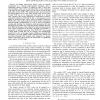Free Online Productivity Tools
i2Speak
i2Symbol
i2OCR
iTex2Img
iWeb2Print
iWeb2Shot
i2Type
iPdf2Split
iPdf2Merge
i2Bopomofo
i2Arabic
i2Style
i2Image
i2PDF
iLatex2Rtf
Sci2ools
112
click to vote
ICC
2008
IEEE
2008
IEEE
Multilevel Structured Low-Density Parity-Check Codes
— Low-Density Parity-Check (LDPC) codes are typically characterized by a relatively high-complexity description, since a considerable amount of memory is required in order to store their code description, which can be represented either by the connections of the edges in their Tanner graph or by the non-zero entries in their parity-check matrix (PCM). This problem becomes more pronounced for pseudo-random LDPC codes, where literally each non-zero entry of their PCM has to be enumerated, and stored in a look-up table. Therefore, they become inadequate for employment in memoryconstrained transceivers. Motivated by this, we are proposing a novel family of structured LDPC codes, termed as Multilevel Structured (MLS) LDPC codes, which benefit from reduced storage requirements, hardware-friendly implementations as well as from low-complexity encoding and decoding. Our simulation results demonstrate that these advantages accrue without any compromise in their attainable Bit Error Ratio (BE...
Related Content
| Added | 30 May 2010 |
| Updated | 30 May 2010 |
| Type | Conference |
| Year | 2008 |
| Where | ICC |
| Authors | Nicholas Bonello, Sheng Chen, Lajos Hanzo |
Comments (0)

